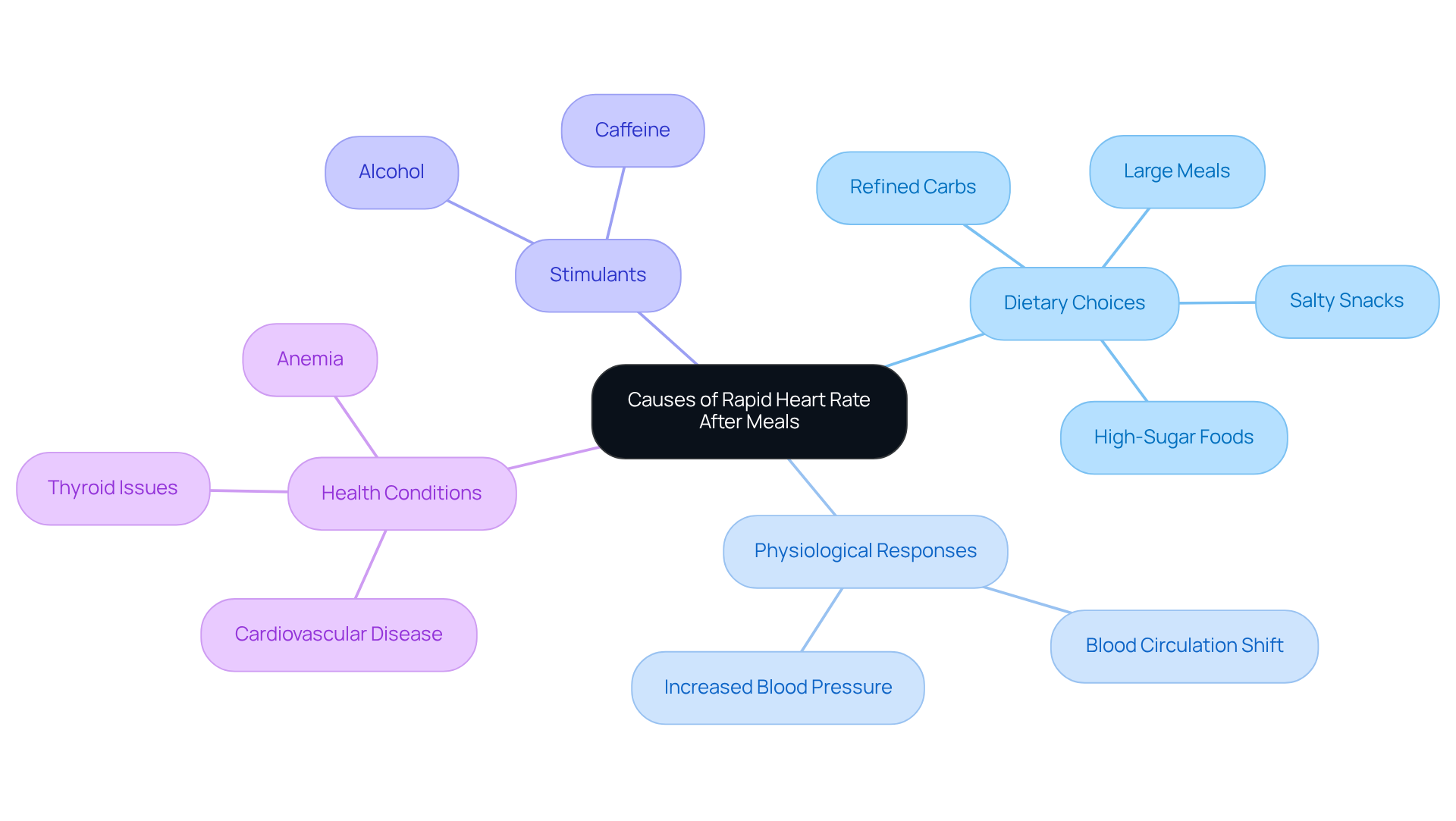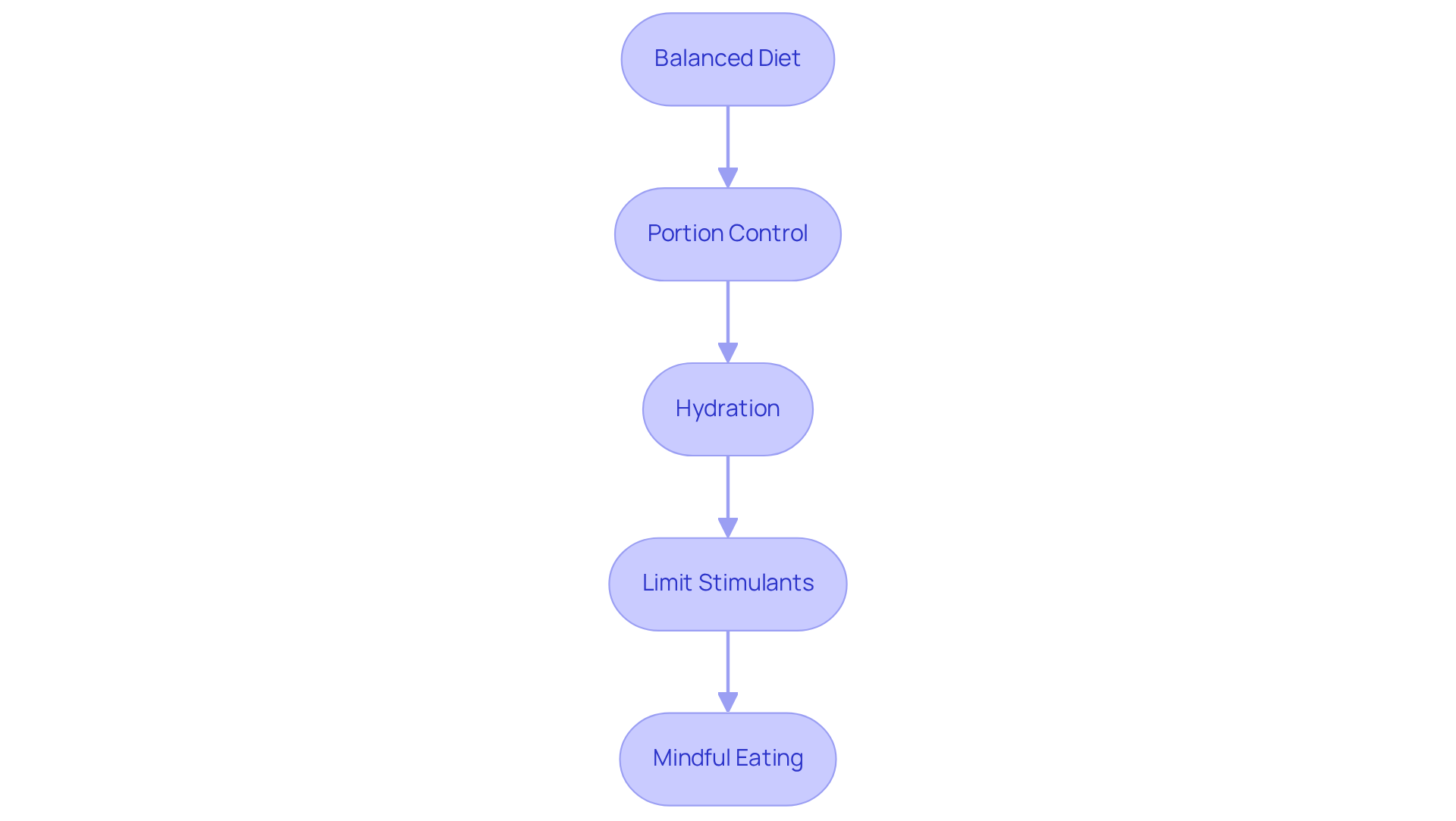


Managing a rapid heartbeat after eating can be concerning, especially for seniors. It’s important to understand that you’re not alone in this experience. Many people face similar challenges, and there are effective ways to address them.
One of the key steps is to focus on a balanced diet. Incorporating a variety of foods can help ensure that your body gets the nutrients it needs. Additionally, practicing portion control can make a significant difference. Eating smaller meals more frequently may ease the strain on your heart.
Hydration is another crucial factor. Drinking enough water throughout the day can help your body function better. Mindful eating—taking your time to enjoy each bite—can also contribute to a more pleasant dining experience.
If you find that your symptoms persist, it’s essential to consult with your healthcare provider. Persistent symptoms could indicate underlying health issues that need attention. Remember, seeking help is a sign of strength, and your health is worth it.
In addition to these dietary changes, consider reflecting on your daily habits. Are there stressors in your life that could be contributing to your symptoms? Taking time to relax and engage in gentle activities can also support your overall well-being.
Ultimately, you deserve to feel your best. By making these small adjustments and reaching out for support when needed, you can take significant steps toward managing your health. Don’t hesitate to talk to your doctor about any concerns you may have. You’re not alone on this journey.
Dietary habits can significantly impact heart health, especially for seniors who might notice their heart rates increasing after meals. It’s essential to understand how our food choices relate to our cardiovascular responses, particularly when managing this common concern. Have you ever wondered what steps you can take to ease these uncomfortable episodes and enhance your overall well-being?
This article explores the reasons behind fast heart rates after eating, offers practical dietary and lifestyle adjustments, and highlights when it’s important to seek medical advice. Our goal is to empower seniors to navigate their health with confidence, knowing that support is always available.
Dietary choices can significantly impact pulse rates after meals, particularly for older adults. High-sugar foods, refined carbohydrates, and salty snacks often lead to spikes in blood sugar and blood volume. For example, enjoying a large plate of pasta or a sugary dessert might result in heart beating fast after eating, which can be concerning.
After eating, blood circulation naturally shifts towards the digestive system, resulting in a temporary increase in pulse. While this is a normal response, it can be more noticeable in older individuals due to age-related changes in cardiovascular health. This makes them more sensitive to fluctuations in pulse rate.
Additionally, stimulants like caffeine and alcohol can exacerbate palpitations. It’s important for seniors to be mindful of their coffee, tea, and alcohol consumption during meals, as these can amplify the body's response.
Health conditions such as anemia, thyroid issues, and cardiovascular disease can also lead to a heart beating fast after eating. It’s essential for seniors to consider their overall health when evaluating their symptoms, as these factors can significantly influence cardiovascular function and general well-being. Keeping track of what you eat and understanding how certain foods affect your pulse can be a helpful way to manage these episodes.
Have you noticed how certain meals make you feel? Remember, you’re not alone in this. If you have concerns, don’t hesitate to reach out for support. Your health matters, and understanding these connections can lead to better management of your well-being.

Balanced Diet: It's important to include a variety of fruits, vegetables, whole grains, and lean proteins in your meals. Foods rich in potassium, like bananas and spinach, along with magnesium sources such as nuts and seeds, can help keep your pulse steady. Remember, nourishing your body is a way to show yourself love.
Portion Control: Eating smaller, more frequent meals can ease the burden on your digestive system. This approach not only helps prevent your heart from working too hard but also reduces the chances of experiencing a heart beating fast after eating. Think of it as a gentle way to care for yourself.
Hydration: Staying well-hydrated is essential for your overall health. Drinking water before meals can help regulate blood volume and lessen pressure on your heart. It’s a simple yet effective way to support your body.
Limit Stimulants: Consider reducing or eliminating caffeine and alcohol, especially during meals. Instead, why not enjoy a soothing herbal tea or a refreshing glass of water? Your body will thank you for it.
Mindful Eating: Take your time while eating. Chewing slowly and savoring each bite can support digestion and ease strain on your heart. This practice not only enhances your dining experience but also allows you to connect with your food and enjoy the moment.

If you often notice a quick pulse, or your heart beating fast after eating, and if it lasts for a while, it’s really important to talk to a healthcare professional. Persistent symptoms might signal an underlying condition, like coronary artery disease, that needs attention. Tachycardia, which is when your pulse exceeds 100 beats per minute, should be monitored closely. At Amavita Heart and Vascular Health, our specialists use advanced diagnostic imaging to pinpoint potential issues, ensuring that any underlying conditions, including plaque buildup in the arteries, are addressed promptly.
If you experience a heart beating fast after eating, along with chest discomfort, shortness of breath, dizziness, or fainting, please seek medical help right away. These could be signs of a more serious issue, especially considering that someone experiences a cardiac arrest every 40 seconds in the United States. Palpitations that come with faintness, shortness of breath, confusion, dizziness, or last more than two to three minutes require immediate medical attention. Our comprehensive arrhythmia management includes continuous monitoring technology to identify specific types of arrhythmias, allowing for timely and effective treatment.
For seniors, keeping regular appointments with healthcare providers is essential to monitor cardiovascular health, especially if there are pre-existing conditions. Regular check-ups can help catch changes in cardiac function early, allowing for timely management. At Amavita, we prioritize personalized care, ensuring that each patient’s unique needs are met through advanced treatments and patient-centered approaches, including minimally invasive procedures like cardiac catheterization and stent placement.
If you’ve been prescribed new medications, it’s a good idea to discuss any side effects, including changes in your pulse, with your healthcare provider to ensure safe management. As Dr. Angela Ryan Lee emphasizes, reaching out to a healthcare expert is crucial if you have any concerns about your pulse rate. Our team is dedicated to providing targeted cardiovascular care, especially for high-risk patients, to enhance overall heart health.
Managing a rapid heart rate after meals is essential for seniors, as it can greatly impact their overall well-being. Have you ever noticed how certain foods affect your heart? Understanding the causes—ranging from dietary choices to underlying health conditions—can empower you to take steps toward maintaining a stable pulse. By recognizing the connection between what you eat and your heart rate, you can make informed decisions that truly benefit your health.
This article highlights practical strategies that can help. Consider adopting a balanced diet rich in essential nutrients, practicing portion control, staying hydrated, limiting stimulants, and embracing mindful eating. These lifestyle adjustments can ease the strain on your heart and promote better digestive health. It's also important to stay vigilant about any symptoms you may experience. If you notice persistent rapid heartbeats or discomfort, don’t hesitate to seek medical advice.
Ultimately, fostering awareness and making thoughtful choices about your diet and lifestyle can lead to improved heart health. Regular check-ups with your healthcare provider are vital for managing any existing conditions effectively. By taking these steps, you can not only manage your heart rate after eating but also enhance your overall quality of life. Remember, you’re not alone in this journey—support is always available.
What dietary choices can affect heart rate after meals?
High-sugar foods, refined carbohydrates, and salty snacks can lead to spikes in blood sugar and blood volume, which may result in a rapid heart rate after eating.
Why does heart rate increase after eating?
After eating, blood circulation naturally shifts towards the digestive system, causing a temporary increase in pulse. This is a normal response but can be more noticeable in older individuals.
How does age affect sensitivity to heart rate changes after meals?
Older individuals may be more sensitive to fluctuations in pulse rate due to age-related changes in cardiovascular health.
Can stimulants impact heart rate after meals?
Yes, stimulants like caffeine and alcohol can exacerbate palpitations, so it's important for seniors to be mindful of their consumption during meals.
What health conditions could lead to a rapid heart rate after eating?
Conditions such as anemia, thyroid issues, and cardiovascular disease can contribute to a fast heartbeat after meals.
How can seniors manage episodes of rapid heart rate after eating?
Keeping track of dietary choices and understanding how certain foods affect pulse can help seniors manage these episodes effectively.
What should someone do if they have concerns about their heart rate after meals?
If there are concerns about heart rate after meals, it is advisable to reach out for support and consult a healthcare professional.